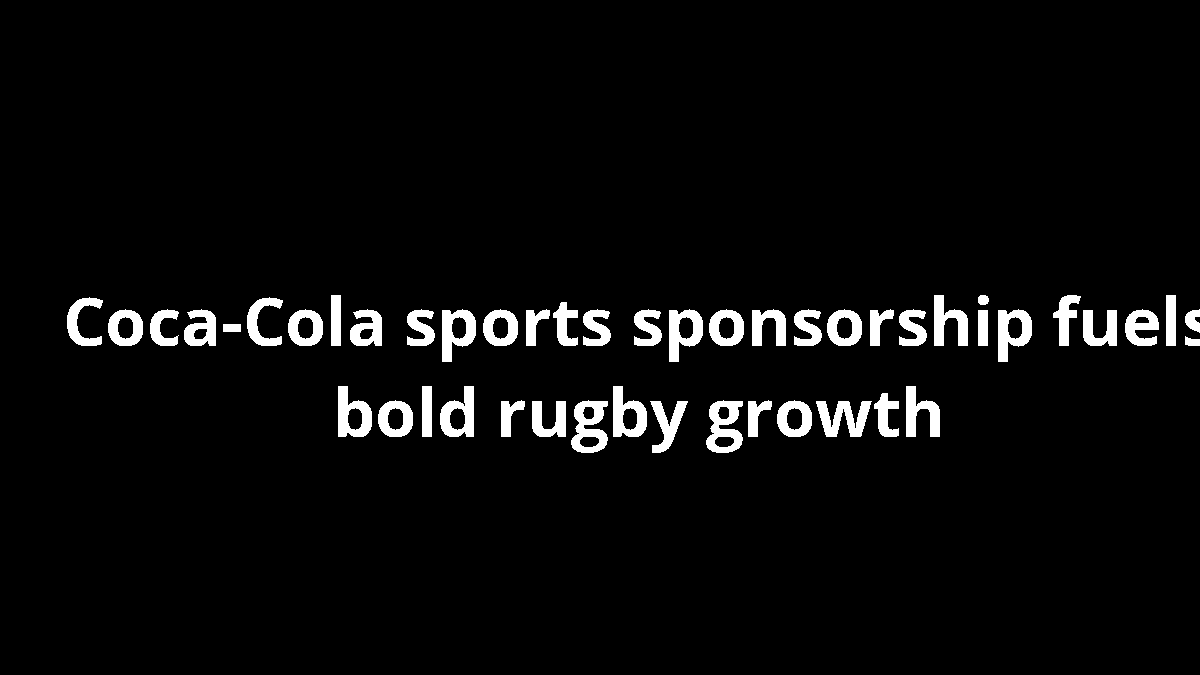Coca-Cola bets on bigger and bolder innovations to drive growth
Global players like Coca-Cola are recalibrating growth plans in a slow economy, pursuing bigger and bolder innovations to sustain momentum. In rugby markets, the Coca-Cola sports sponsorship strategy extends beyond logos, shaping partnerships, activation plans, and stadium experiences that connect with fans at scale. The Coca-Cola sports sponsorship narrative now emphasizes breakthrough formats and packaging that refresh the brand while opening new revenue opportunities. This approach seeks to blend product design with fan-focused activations, aiming to turn sponsors into integral parts of the game-day story rather than mere on-site branding. For readers tracking sponsorships in rugby, the coming months will be telling as activations migrate from traditional boards to immersive, cross-channel experiences that travel from arenas to online communities.
Meanwhile, the broader shift signals a move away from static sponsorships toward integrated programs that leverage data, digital channels, and co-branded consumer experiences. In rugby ecosystems, this could translate into more thoughtful partner ecosystems, cross-sport collaborations, and longer-term commitments that help clubs weather macro headwinds. The evolving Coca-Cola sports sponsorship playbook is about turning every touchpoint into value, whether it’s a match-day activation, a limited-edition bottle, or a social campaign that ties into a live game. The net effect could be higher fan affinity, stronger sponsor stewardship, and more predictable revenue streams for clubs and unions alike.
Rugby fan experiences at scale
As Coca-Cola looks to connect more deeply with live matches, clubs are exploring enhanced on-site activations, digital interactions, and multisensory fan zones. These initiatives aim to heighten the sense that a sponsor is part of the game, not just a backdrop. For context on how sponsorships translate into real-world experiences, look to coverage from BBC Sport Rugby. In practice, expect stadium QR campaigns, augmented reality moments, and sponsor-hosted lounges that blend hospitality with interactive entertainment. The emphasis is on consistency across markets and competitions, ensuring fans feel a coherent brand story irrespective of where they watch.
Global brand alignment with rugby markets
Across markets, Coca-Cola sports sponsorships can align with key rugby properties, delivering consistency with local culture, player ambassadors, and long-term partnerships. That alignment matters in a sport with diverse audiences—from traditional unions to fast-growing franchises—where sponsors seek meaningful, lasting relationships. Industry observers will watch how Coca-Cola’s packaging and product innovations intersect with sponsorship activation, delivering tangible benefits for clubs and fans. As a reference point, World Rugby’s content illustrates how partnerships extend beyond simply presenting a logo and into shared values and community programs. See World Rugby for broader context on sponsorship integration across the sport.
Packaging and product innovations to fuel growth amid a slow economy
Packaging and product innovations are playing a central role in Coca-Cola’s growth blueprint as the company navigates currency pressures and shifting consumer preferences. The emphasis on smarter packaging, sustainable materials, and new formats is designed to refresh the portfolio and open doors to category extensions. In rugby markets, these innovations can translate into on-pack promotions tied to matchdays, stadium experiences, and digital engagement campaigns. The Coca-Cola sports sponsorship lens helps ensure that packaging ideas amplify fan connection rather than merely enhancing shelf appeal. In a crowded soft drinks landscape, innovation can create talking points that drive loyalty across channels while supporting healthier, more sustainable choices for consumers who still crave a refreshing break during a game-day grind.
For fans and sponsors alike, the practical upside lies in cross-channel storytelling that links product design with live events, mobile experiences, and social conversations. The company’s push toward breakthrough formats may see limited-edition bottles featuring popular rugby players, team-themed campaigns, or in-app rewards linked to match outcomes. In football as well as rugby, such activations are often more effective when they are authentic and embedded in the sport’s culture. To understand how sponsorships shape these narratives, a look at BBC Sport Rugby coverage provides valuable insights into activation trends and fan expectations in major markets. BBC Sport Rugby offers useful examples of sponsor-integrated experiences that resonate with supporters.
Packaging innovations and sustainability
Innovations in packaging are not just about aesthetics; they’re also about sustainability and convenience. In rugby ecosystems, sustainable packaging can become part of a broader environmental program that fans notice and support. For instance, lighter, recyclable materials and reduced plastic use can align with club sustainability commitments, while in-venue recycling campaigns provide touchpoints for sponsor messaging. The cross-pollination between packaging and fan engagement can create meaningful, measurable outcomes for partners and rights-holders alike, ensuring that every new bottle or carton tells a story that fans want to share with friends and followers.
Q3 marketing spend rises as Coca-Cola doubles down on Innovation
In its Q3 update, Coca-Cola signaled a willingness to increase marketing spend as part of an acceleration in innovation cycles. The strategy aims to unlock new revenue streams and reinforce consumer loyalty across channels, even amid macro headwinds. For rugby, higher marketing investment could manifest in more robust sponsorship campaigns, co-branded content, and larger-scale fan events that extend beyond stadium walls. The focus on rapid experimentation means sponsors and clubs may trial new formats—such as live-streamed activations, mobile games tied to matchdays, and data-informed promotions—that strengthen engagement and monetization opportunities across geographies. Therefore, the potential upside includes deeper brand affinity among younger fans who expect instant access to content, experiences, and rewards linked to their favorite teams. The Coca-Cola sports sponsorship lens will be essential to monitor how these investments translate into on-field visibility and off-field value.
Marketing spend and sponsorship impact
Higher marketing spend typically correlates with more ambitious activation plans and partner ecosystems. Rugby rights-holders may see expanded sponsor activation budgets, enabling bigger stadium experiences and more personalized fan journeys. For readers following performance metrics, such investments should translate into heightened engagement, improved sponsor recall, and better long-term sponsorship terms. Meanwhile, industry observers will be watching for how currency movements and supply-chain costs influence the pace of innovation—and whether the gains in visibility and loyalty offset near-term expenditure. As a reference point for sponsorship strategy, World Rugby’s publications emphasize the importance of fan-first engagement in successful partnerships. See World Rugby for related analyses of sponsorship effectiveness and fan engagement.
Impact on sports sponsorship and fan engagement in football
The Coca-Cola sports sponsorship agenda in football offers a useful proxy for rugby, illustrating how aggressive brand-building can coexist with responsible sponsorship ethics and fan-first storytelling. While the two sports command different ecosystems, the underlying principles—authentic partnerships, activation-led experiences, and data-driven engagement—are transferable. The cross-sport approach can yield insights into how sponsors tailor messages for diverse audiences, integrate digital channels with live events, and measure impact across countries and leagues. Rugby fans may benefit as brands learn to blend performance data with entertaining, educational content that deepens loyalty and expands reach. As Coca-Cola sharpens its football portfolio, rugby stakeholders should monitor how similar playbooks might translate into more durable, value-driven partnerships across unions and clubs. For a broader view of sponsorship dynamics in global rugby, BBC Sport Rugby remains a strong resource for analyzing activation trends and fan responses across competitions. BBC Sport Rugby.
Cross-sport sponsorship strategies
Cross-sport sponsorship strategies can unlock efficiency by sharing assets, talent, and content across football and rugby. Brand teams may leverage joint events, unified social campaigns, and co-branded storytelling that appeal to fans who follow multiple sports. The challenge lies in maintaining sport-specific relevance while delivering a coherent global narrative. Rugby organizations can take cues from football activations that blend entertainment, charity initiatives, and community programs into sponsor partnerships. By aligning with local cultures and delivering memorable in-stadium experiences, Coca-Cola and its partners can strengthen trust and long-term loyalty among diverse supporter groups. For more on how sponsorships translate into tangible experiences, World Rugby’s insights on rights-holders’ collaboration provide useful perspectives. World Rugby.


